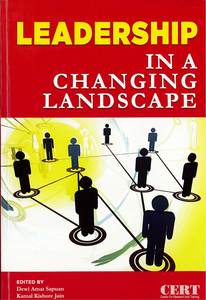Unravelling leadership barriers in Papua New Guinea
Prideaux, Murray, and Beg, A.B.M. Rabiul Alam (2008) Unravelling leadership barriers in Papua New Guinea. In: Sapuan, Dewi Amat, Jain, Kamal Kishore, and Sandhu, Manjit Singh, (eds.) Leadership in a Changing Landscape. Proceedings of the International Conference on Leadership in a Changing Landscape 2007 . CERT Publications, Kuala Lumpur, Malyasia, pp. 155-179.
This is the latest version of this item.
![[img]](https://researchonline.jcu.edu.au/19971/1.hassmallThumbnailVersion/19971_Prideaux_and_Beg_2008_book_cover.jpg)
|
Image (JPEG) (Book Cover)
- Cover Image
Download (263kB) |
|
|
PDF (Published Version)
- Published Version
Restricted to Repository staff only |
Abstract
The context, barriers and practice of leadership in less developed countries, and Papua New Guinea (PNG) in particular, has not attracted the attention of leadership researchers with the same level of enthusiasm as leadership issues in developed countries. PNG is a diverse Nation of tribal societies largely organised on the basis of kinship and traditional cultural practices. The unique context and challenges of leadership in PNG are not adequately explained by the extant literature. Littrell (2002) argues that, 'the bulk of leadership literature is based on a self-limiting set of assumptions, mostly reflecting Western industrialised culture. Almost all the prevailing theories of leadership and almost all of the empirical evidence are rather distinctly American in character' ( p:l0). Leadership theories based on 'Western' culture are not directly transferable to PNG, whilst significant contextual barriers act to inhibit leadership processes. Leadership barriers (Prideaux, 2006) were tested. Respondents reported that a lack of' roads and logistic infrastructure; organisational and national vision; leaders poor 'people' skills; inadequate communication systems; the continuing practice of 'traditional' leadership values, thinking and culture in the workplace; the custom of Chief tan, Inheritance, Bigman, and Wantok are significant leadership barriers. A lack of a common language and working to 'PNG time' are further major barriers inhibiting effective leadership. Results reveal a requirement for an integrative leadership approach contextualised to PNG's diversity and complexity, and cognizant of the barriers identified, is required, if PNG is to integrate with an increasingly globalised world economy. Limitations and further research are considered.
| Item ID: | 19971 |
|---|---|
| Item Type: | Book Chapter (Research - B1) |
| ISBN: | 978-983-43710-7-4 |
| Keywords: | leadership; context; barriers; Papua New Guinea |
| Related URLs: | |
| Date Deposited: | 14 Feb 2012 01:44 |
| FoR Codes: | 15 COMMERCE, MANAGEMENT, TOURISM AND SERVICES > 1503 Business and Management > 150312 Organisational Planning and Management @ 100% |
| SEO Codes: | 94 LAW, POLITICS AND COMMUNITY SERVICES > 9405 Work and Institutional Development > 940502 Professions and Professionalisation @ 100% |
| Downloads: |
Total: 531 Last 12 Months: 2 |
| More Statistics |
Available Versions of this Item
-
Unravelling leadership barriers in Papua New Guinea. (deposited 03 Dec 2009 01:04)
- Unravelling leadership barriers in Papua New Guinea. (deposited 14 Feb 2012 01:44) [Currently Displayed]



